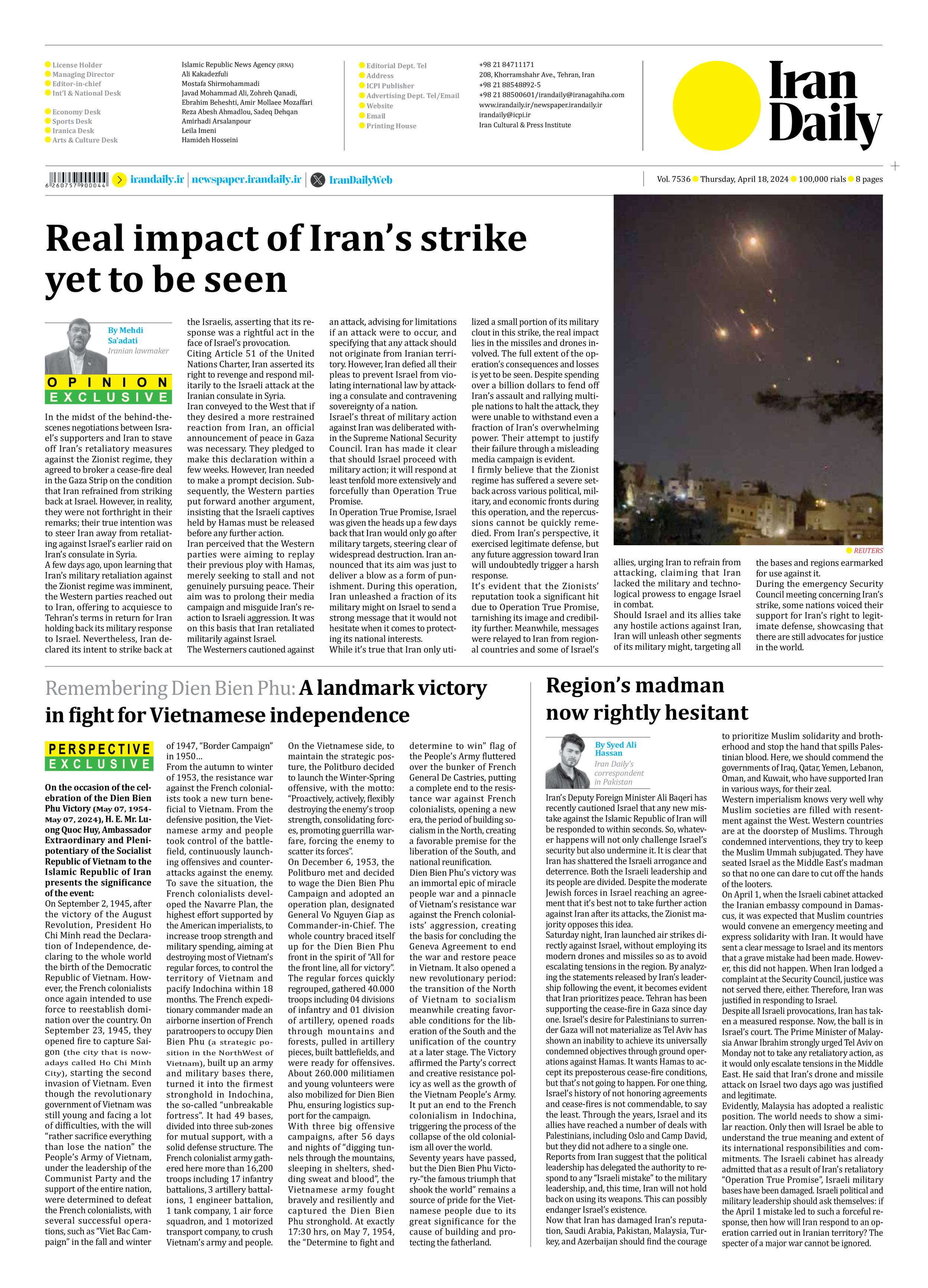
Copy in clipboard...
Remembering Dien Bien Phu: A landmark victory in fight for Vietnamese independence
On September 2, 1945, after the victory of the August Revolution, President Ho Chi Minh read the Declaration of Independence, declaring to the whole world the birth of the Democratic Republic of Vietnam. However, the French colonialists once again intended to use force to reestablish domination over the country. On September 23, 1945, they opened fire to capture Saigon (the city that is nowadays called Ho Chi Minh City), starting the second invasion of Vietnam. Even though the revolutionary government of Vietnam was still young and facing a lot of difficulties, with the will “rather sacrifice everything than lose the nation” the People’s Army of Vietnam, under the leadership of the Communist Party and the support of the entire nation, were determined to defeat the French colonialists, with several successful operations, such as “Viet Bac Campaign” in the fall and winter of 1947, “Border Campaign” in 1950…
From the autumn to winter of 1953, the resistance war against the French colonialists took a new turn beneficial to Vietnam. From the defensive position, the Vietnamese army and people took control of the battlefield, continuously launching offensives and counterattacks against the enemy. To save the situation, the French colonialists developed the Navarre Plan, the highest effort supported by the American imperialists, to increase troop strength and military spending, aiming at destroying most of Vietnam’s regular forces, to control the territory of Vietnam and pacify Indochina within 18 months. The French expeditionary commander made an airborne insertion of French paratroopers to occupy Dien Bien Phu (a strategic position in the NorthWest of Vietnam), built up an army and military bases there, turned it into the firmest stronghold in Indochina, the so-called “unbreakable fortress”. It had 49 bases, divided into three sub-zones for mutual support, with a solid defense structure. The French colonialist army gathered here more than 16,200 troops including 17 infantry battalions, 3 artillery battalions, 1 engineer battalion, 1 tank company, 1 air force squadron, and 1 motorized transport company, to crush Vietnam’s army and people. On the Vietnamese side, to maintain the strategic posture, the Politburo decided to launch the Winter-Spring offensive, with the motto: “Proactively, actively, flexibly destroying the enemy’s troop strength, consolidating forces, promoting guerrilla warfare, forcing the enemy to scatter its forces”.
On December 6, 1953, the Politburo met and decided to wage the Dien Bien Phu Campaign and adopted an operation plan, designated General Vo Nguyen Giap as Commander-in-Chief. The whole country braced itself up for the Dien Bien Phu front in the spirit of “All for the front line, all for victory”. The regular forces quickly regrouped, gathered 40.000 troops including 04 divisions of infantry and 01 division of artillery, opened roads through mountains and forests, pulled in artillery pieces, built battlefields, and were ready for offensives. About 260.000 militiamen and young volunteers were also mobilized for Dien Bien Phu, ensuring logistics support for the campaign.
With three big offensive campaigns, after 56 days and nights of “digging tunnels through the mountains, sleeping in shelters, shedding sweat and blood”, the Vietnamese army fought bravely and resiliently and captured the Dien Bien Phu stronghold. At exactly 17:30 hrs, on May 7, 1954, the “Determine to fight and determine to win” flag of the People’s Army fluttered over the bunker of French General De Castries, putting a complete end to the resistance war against French colonialists, opening a new era, the period of building socialism in the North, creating a favorable premise for the liberation of the South, and national reunification.
Dien Bien Phu’s victory was an immortal epic of miracle people war and a pinnacle of Vietnam’s resistance war against the French colonialists’ aggression, creating the basis for concluding the Geneva Agreement to end the war and restore peace in Vietnam. It also opened a new revolutionary period: the transition of the North of Vietnam to socialism meanwhile creating favorable conditions for the liberation of the South and the unification of the country at a later stage. The Victory affirmed the Party’s correct and creative resistance policy as well as the growth of the Vietnam People’s Army. It put an end to the French colonialism in Indochina, triggering the process of the collapse of the old colonialism all over the world.
Seventy years have passed, but the Dien Bien Phu Victory-“the famous triumph that shook the world” remains a source of pride for the Vietnamese people due to its great significance for the cause of building and protecting the fatherland.







